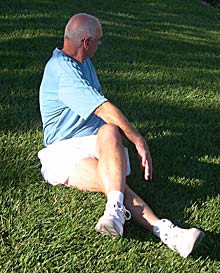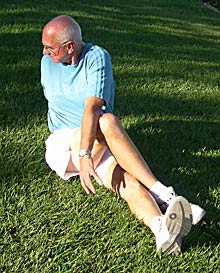|
TennisOne Lessons


Holistic Tennis Guidelines for Match Play
Happy Bhalla
Pre-Match Preparation
Prepare your self physically with an on-court warm-up, whenever possible, and with mindful (with the focus on the muscle you are working on) and silent stretching.
  Prepare your self physically by stretching whenever possible.
Prepare your self physically by stretching whenever possible. |
Prepare yourself mentally for the match by lying or sitting down silently with your eyes closed and taking long, deep breaths for 5 minutes and another 10-15 minutes of normal breathing before the match. And by watching and then letting go of all thoughts'
Let go of all thoughts about winning or losing. All thoughts are noise, which will give rise to emotions such as fear, anxiety, nervousness, tension, over-confidence, etc., all of which are a hindrance to peak performance.
Silence happens when we do not indulge these thoughts. Yes, they will arise, acknowledge them without judgment and let them go. Do not pander to them, engage them or argue against them. Rational logic is not the way out, only dropping everything is!
The nurturing of silence is a process. Simply make the space by setting aside the time to watch the mind and its incessant thoughts which continue to come and go and silence will grow in you.
You cannot control winning or losing; playing well or badly. The only things you can control are your effort and attitude. Effort means being present and trying to do the best you can, while attitude is about being able to accept all that happens to you.
Click photo: Before the match go through an on-court warm-up routine, using all your strokes.
|
There are two possible outcomes from this match: winning or losing. If you can live with either of these outcomes, silence will come more easily to you and you will be more able to play your best tennis
Your goal is to go out there and try and play the best tennis you are capable of—that is all! And the more relaxed you are, the more likely that is to happen.
Your goal is to be the best tennis player you can possibly be, which is a process that will take place over time. By playing loose and carefree you will be moving towards playing to your potential. Consequently, the outcome of this match will not make or break you or your life. Keeping things in perspective will allow you to play in a more relaxed way.
During Match-Play
You will play your best tennis when you are mentally and physically in a state of relaxed intensity: calm and silent, but yet extremely alert. This happens when the mind is free of ALL thought.
A silent mind will result in a fluid body. A silent mind is not dead. When you are silent and alert you are IN THE HERE AND NOW and in such a state you will play the best tennis you are capable of, at this moment in time.
You can lose from a winning position and win from a losing position so focus on playing your very best on EVERY point until the match is over. Do not play differently if you are winning or losing, let the situation dictate shot selection, not the score!
Click photo: In between points and games do not allow your mind to wander. Focus on your breath or simply be silent.
|
Negative emotions invariably create an obstacle to peak performance. Do not try and justify your anger or frustration. Accept it as a reality, and then let go as quickly as you can and go back to playing the next point from a state of relaxed intensity.
When the ball is in play, get lost in the ball! Focus on the ball from the moment it hits the opponent's racquet, follow it as it goes over the net and touches the ground on your side and all the way until it hits your racquet and then follow its path back to the opponent's racquet.
In between points and games do not allow your mind to wander. Focus on your breath or simply be silently with yourself. Walk mindfully and purposefully, with all your attention on the small things you are doing.
From time to time, ask your self, ‘How am I winning points' and ‘How am I losing points'. Simply make observations about what is happening in the match, without judgment or analysis. If you are in the present, the answer to these questions will come easily.
Let go of the past as quickly as you can. The lead you had, the break point chances you missed, the easy errors on crucial points, the bad calls, etc. They are all past: over and done. The match is still not over. Give your very best until the last point has been played.
You will play your best tennis when your mind is silent, nothing activates the mind more than an error and the subsequent analysis and looking for a solution. Do not look for a solution, let go of the last shot and focus on getting back into that state of relaxed intensity and you will play the best tennis you are capable of!
 After the match, write down all your observations and thoughts.
After the match, write down all your observations and thoughts. |
Post-Match Recovery
Try and spend some time alone and watch your emotions: how does winning make you feel? How does losing make you feel? Why is this? If you truly love playing should there be this variation of emotion? What else can you learn from these observations?
Do not act or make decisions when you are still in the throes of the emotions resulting from the outcome of the match. Just observe all that is happening to you and forego all action until you have regained your centeredness and perspective.
When this initial period has passed, write down all your observations and thoughts about the match.
Whether you have won or lost the match, the single most important factor at its conclusion is recovery: both physical and mental. Physical recovery usually involves stretching, perhaps a little jogging and maybe even a visit to the trainer or physical therapist. Mental recovery usually involves some fun or relaxing activities unrelated to tennis. The length of this mental recovery period should be as long as it takes for the enthusiasm to train and hit the ball to return.
If you won the match and have to play again soon, you will need to examine what you have written and either practice if there is a part of your game that needs immediate attention or, if you are happy with your game, simply allow extra recovery time.
If you lost the match, when the time is right return to the court and gym and gear your practices towards the lessons learned from the previous match or tournament and mesh these observations with your long-term developmental needs.
Click photo: Afterward, gear your practices towards the lessons learned from the previous match or tournament
|
Do not return to the practice court out of guilt or a missed place sense of professionalism. Your time on the court will not be productive unless you are totally THERE! You will know when the time is right.
Every player should have a clear understanding of their strengths and weaknesses and what they are trying to do on the court in competition and know what they need to do to get to the next level (which is an on-going process). If this is not the case, you need to find a coach to help you!
Practices should be very structured and matches should be played instinctively. For most players it is the other way around and that does not work. Isolate any part of your game that did not work during the match and practice those situations. Be as specific as possible. Which stroke? What height was the ball? Where was it on the court? What spin and speed did the in coming ball have? Where were you trying to hit it? In addition, continue to practice those combinations that best highlight your strengths and that allow you to impose your will on the game.
Basically, not much should change after one match. You should have a clear understanding of your long and short-term goals. Resist the temptation to panic. Stay focused on your long-term goals to develop your game.
|



